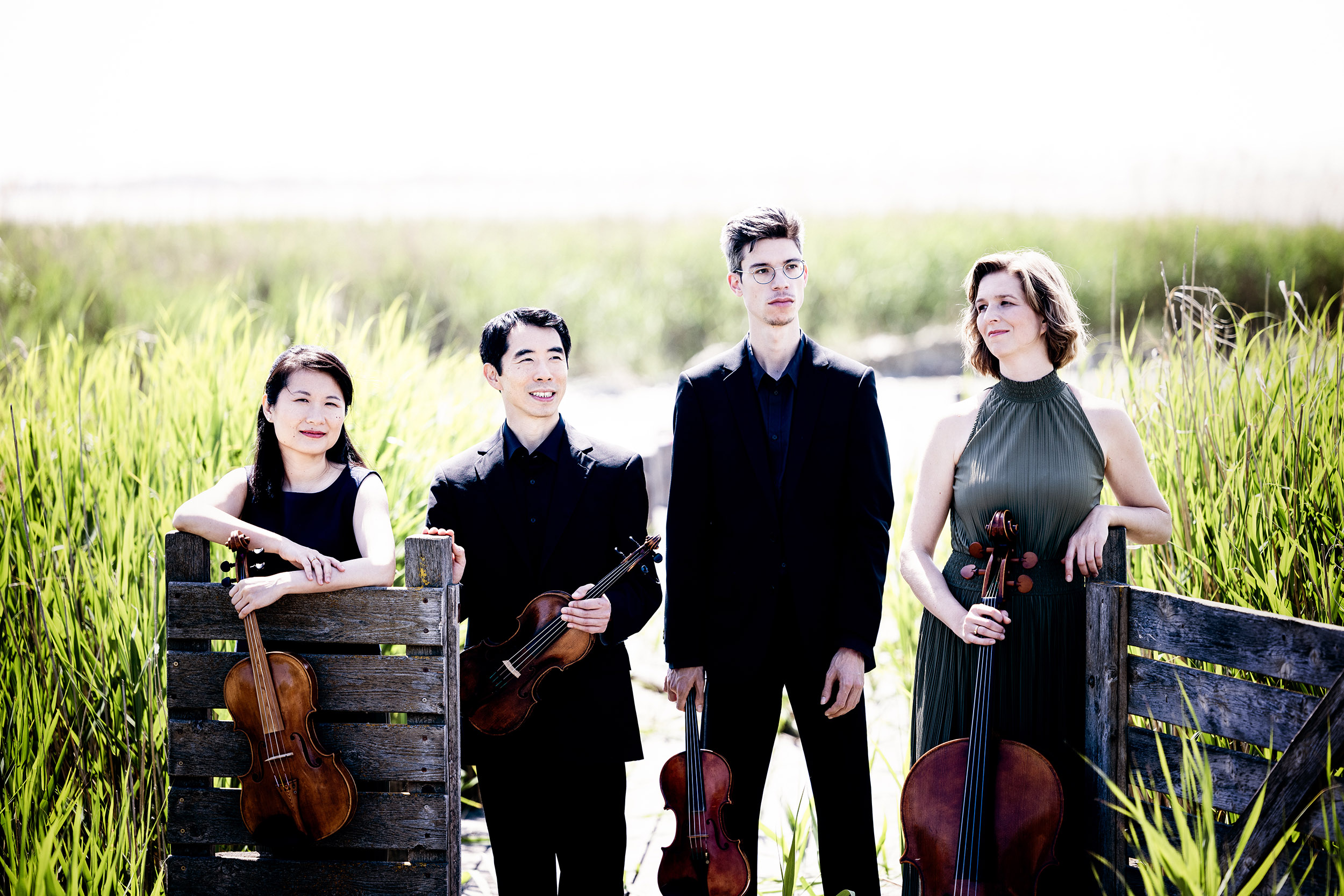SZENEN OHNE WORTE
PACIFIC QUARTET VIENNA

Photo: Julia Wesely
„The young, multinational string quartet placed great importance on finding a sensitive blend through shared breath—warm and supple, yet free from any sentimentality.“
Die Presse
How did opera composers translate the dramatic power of their stage works into the intimate world of a string quartet, often considered the supreme discipline of chamber music? This question is at the heart of the Pacific Quartet Vienna’s new CD recording. The four experienced musicians from Vienna and Zurich share an artistic approach in which „each member takes full responsibility for the moment and for the dialogue.“Their in-depth exploration of musical rhetoric shapes their interpretation of Mozart’s Dissonance Quartet, Gaetano Donizetti’s String Quartet No. 17 in D Major, and Giuseppe Verdi’s onlyquartet in E Minor.
Mozart was the starting point for this project. „It is clearly audible how profoundly Mozart was influenced by the world of opera, which had spread across Europe from Italy,“the ensemble explains. Written in 1785, his String Quartet in C Major, K. 465 reflects an intense artistic dialogue with Joseph Haydn. The nickname Dissonance Quartetrefers to the remarkably daring experimentation for its time. Its famous Adagio introduction captivates with tense harmonies and bold cross-relations, which contemporaries saw as breaches of the pura scrittura(pure composition). Yet Mozart, being Mozart, masterfully integrates learned techniques into a gallant, flowing style. His rich harmonic palette and surprising shifts between major and minor reveal the theatrical spirit of grand opera, seamlessly merging Italian lyricism with German structural rigor. The dramatically effervescent finale, full of chromaticism and striking minor-key intrusions, ultimately dispels the initial chiaroscuro.
With Donizetti’s String Quartet No. 17, the Pacific Quartet Vienna demonstrates that the Northern Italian bel cantomaster also made remarkable contributions to chamber music. His later quartets, including this one, are just as distinctive as his famous operas. The performers are particularly drawn to the „immediate, dynamic nature“of Donizetti’s voice leading, which unfolds operatic drama in the quartet format. The Larghetto cantabiletransitions from characteristic Italian timbres to a wistful nocturne accompanied by pizzicato, while the vibrant minuet and folk-inspired finale highlight the work’s Mediterranean character.
Did Giuseppe Verdi compose his only string quartet merely as a pastime during the intense rehearsals for the premiere of Aida? Initially, he didn’t even intend to publish it—making its accomplished formal mastery all the more surprising. After the uncharacteristically rigorous opening movement, the Andantinounfolds a poetic synthesis of waltz and canzone. The third movement features an elegant cello cantilena, while the intricately fugued and rhythmically electrifying finale foreshadows the buffobrilliance of Falstaff, which would crown Verdi’s oeuvre two decades later.
Pacific Quartet Vienna
Since its founding, the Pacific Quartet Vienna has been dedicated to continually sharing „the essence of its research“with audiences. The artistic work of this multinational ensemble, based in Vienna and Zurich, is distinguished by remarkable diversity. The quartet regularly develops museum-specific concert programs with a special focus on contemporary music. Additionally, it is deeply committed to intercultural exchange projects between Europe and Asia. A unique fairytale concert program introduces both children and adults to sounds, languages, and philosophies from different cultural traditions.
The quartet’s four musicians bring together top-tier international expertise. First violinist Yuta Takase, born in Yokohama, studied at the Paris Conservatoire and in Vienna, where he achieved numerous international competition successes. Swiss violinist Simon Wiener, winner of the 2019 International Johannes Brahms Competition, studied with Zakhar Bron, Renaud Capuçon, and Ilya Gringolts. Taiwanese violist Chin-Ting Huang graduated with honors from the University of Music and Performing Arts Vienna, studying under Ilse Wincor and Johannes Meissl. Swiss cellist Sarah Weilenmann, an alumna of the New England Conservatory of Music and the University of Music Vienna, balances her quartet career with engagements with the Vienna Symphony Orchestra and a teaching position at the Zurich Conservatory.
Highlights of recent concert seasons include performances at the Vienna Musikverein, London’s Wigmore Hall, and the Brucknerhaus Linz, as well as appearances at renowned festivals such as Styriarte Graz, Trame Sonore Mantova Chamber Music Festival, Haydn Festival Burgenland, Kalkalpen Festival, and the Lucerne Festival. The ensemble’s international significance is underscored by multiple CD and radio recordings with Austrian label Gramola, the Austrian Broadcasting Corporation (ORF), and Swiss Radio and Television (SRF), as well as successful tours to Italy, Japan, and Taiwan.
The Pacific Quartet has received numerous awards, including First Prize, the Audience Prize, and the Best Interpretation of a Work by Joseph Haydn Prize at the 6th International Joseph Haydn Chamber Music Competition in Vienna (2015). Further distinctions followed with the August Pickhardt Prize from the City of Basel (2016) and the New Austrian Sound of MusicAward (2018/19).